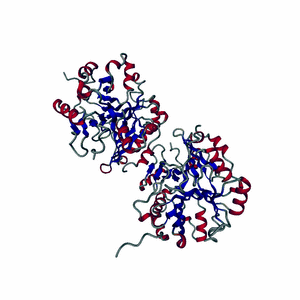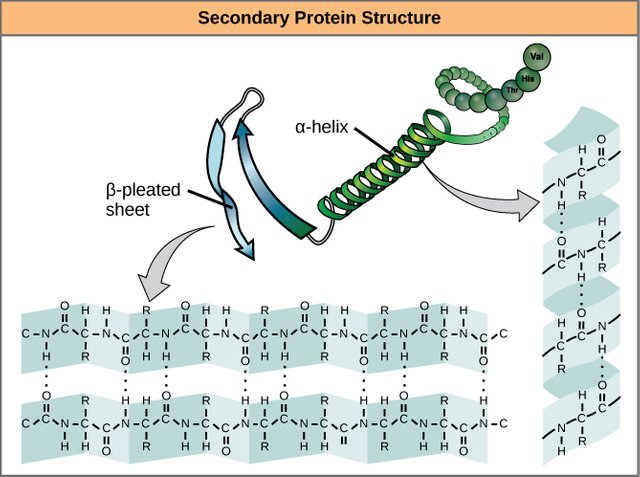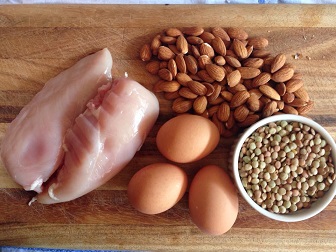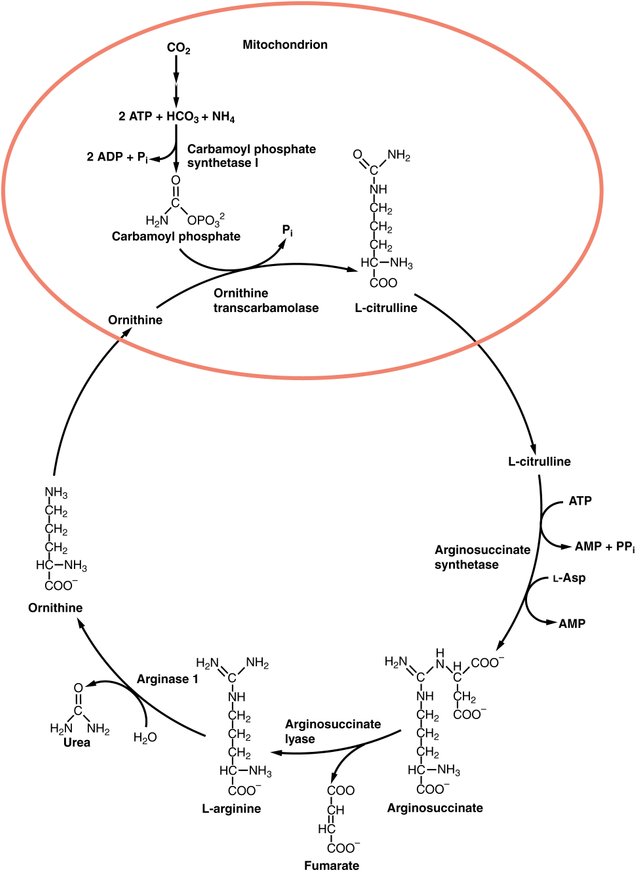One of my best friends started following the so called keto-diet. It is a diet that is based on healthy fats and proteins. Even before he started the keto-diet, I heard about possible health benefits of protein-heavy diets. Frankly, I base my diet on proteins. Today I want to talk about protein-heavy diets and its possible health implications.
What Are Proteins
Proteins are made in several steps. The production of proteins is based on genes and the process by which proteins are made based on DNA is called the central dogma of molecular biology, which states that DNA is transcribed into RNA, which is then translated into
proteins (1). This process can be broken down in three steps.

The DNA is transcribed into messenger RNA (mRNA). The processing of mRNA differs between cells that have a nucleus (eukaryotes) and cells that do not have a nucleus, like bacteria (prokaryotes). After transcription in eukaryotes, the mRNA is capped, a tail is added and certain regions of the mRNA are cut (splicing)(2). The processed mRNA is then transported into the cytoplasm where it is translated by ribosomes. In prokaryotes translation and transcription occur simultaneously, as there is no further mRNA processing (2). During translation, amino acids are linked by the ribosome, according to the sequence given in the mRNA. The result is a chain of amino acids, which constitutes the primary structure (3). Due to hydrogen bonding and other intramolecular forces, the amino acid chain assumes a 2D structure, which is called the secondary structure (4).

With the help of molecular chaperones and due to hydrophobic effects the 2D structure assembles into a 3D structure, which is called the tertiary structure, and often constitues a so called monomer(5) The tertiary structure can then link with other tertiary structures (several monomers combining) or metal atoms to form the quarternary structure, which usually is the functional form of a protein (6). Structure is what determines the function of a protein. It is often difficult to predict the structure of a protein from its corresponding gene. However, modern technology has enabled us to study the structure of proteins - the technique most commonly used is called X-ray crystallography (7). I must add though, that proteins are dynamic and x-ray crystallography is only the best model we currently have.
Proteins fulfill many roles in our body. They can assume the role of enzyme or build up tissue (such as in muscles). Without proteins, humans cannot exist. However, as I explained above, we are able to produce our own proteins and ingesting proteins does not mean that those proteins are used in our body. In general, proteins are digested and broken down into amino acids, which then can be used to produce proteins by our body (8).
Proteins And Health
Again, proteins are made from amino acids. So dietary intake of proteins can help to replenish our resources of amino acids for protein production. The current recommendated daily amount of protein intake for an adult is 0.80g per kg of body weight (9). Sadly, there is not a lot of data available what consumption of more than the recommended amount of proteinwould do to our heealth. However, there are some studies that suggest that healthy proteins may have benefits. A study conducted in Japan showed that daily consumption of an egg for breakfast improved "daily nutritional status and dietary habits and also ameliorate certain indices of antioxidant status in young women" (10). It seems that healthy proteins may be helpful in the prevention of several diseases such as cardiovascular disease (11).

However such health benefits are only observed from "healthy" protein sources. It appears that proteins ingested from red meat sources can increase the risk of heart disease (12). Another study has shown a correlation between consumption of red meat and coronary heart disease in women (13). Red meat consumption is also associated with an increased risk in diabetes type 2 (14). Additionally, a study has shown a link between red meat and an increased risk in colon cancer (15). It seems that the protein source matters. Red meats as a major protein source seem to be potentially risky. Proteins obtained from fish, nuts, eggs and poultry seem to be more beneficial than harmful.

However, there is always too much. The body breaks down proteins using a cellular organelle called proteasome. Here proteins get degraded into amino acids (16). Amino acids can be further degraded by stripping of the nitrogen and binding it into urea, which then can be excreted in urine (17). Some researchers think that there may be a link between high protein diets and kidney disease. However, research has only shown that high protein diets may be harmful for people with chronic kidney disease (18). There is still a need for more research, and so it is difficult to state whether high protein diets can cause renal disease or not (19). High protein diets seem to be helpful to lose weight (20). This can be summed up in the following way. For most healthy adults, a high protein diet is probably not going to be harmful, however, the quality of the consumed proteins matters. And again, moderation and balance is key.
Shameless Self-Advertisement
Thank you very much for your time. If you liked this post, please upvote and resteem. You may also like some of my other posts so please feel free to check it out!
At this point I would like to appreciate the continued efforts of researchers, who are working hard to elucidate the mechanisms of life and understand the fundamentals of the natural laws and their implications.
As always,
Cheers @lesshorrible!
Sehr interessant zu lesen!
Vielen dank war sicher eine menge Arbeit
Es wäre noch interessant zu wissen ab wann es als eine "high Protein diet" zählt
Downvoting a post can decrease pending rewards and make it less visible. Common reasons:
Submit
Ja war viel Arbeit @todfreund! "High Protein" wäre wenn du über die empfohlene tägliche Menge von 0.8 gram pro kg Körpergewicht gehst. Manche sagen auch mehr als 56g für einen Mann oder 46 gram. Eine andere Definition ist dass man nicht mehr als 35% seiner Kalorien aus Proteinen beziehen sollte.
https://www.hsph.harvard.edu/nutritionsource/what-should-you-eat/protein/#ref1
Cheers!
Downvoting a post can decrease pending rewards and make it less visible. Common reasons:
Submit
With how many cows we have on this planet it seems red meat isnt going away. If only fish didnt contain mercury it would be a great source. Kidneys would only have a hard time if your daily water intake was lacking. You know that saying "if you can see your pee your dehydrated". High protein means more urea and thus you need to dilute it to keep the kidneys working. Just my theory, nice topic :)
Downvoting a post can decrease pending rewards and make it less visible. Common reasons:
Submit
Proper eating habits are very needed for our body immune system . The importance of protein plays an important role in this process. Proper balance diet carries the same importance for all ages. Everyone should take proper balance diet and should take proper protein and keep healthy. Your research is very beneficial. I like your post. Thanks for sharing.
Downvoting a post can decrease pending rewards and make it less visible. Common reasons:
Submit
Good article @lesshorrible!
It has been great that you made a difference between eukaryotes, which have a nucleus and cells that do not have a nucleus, like bacteria (prokaryotes).
As you also said, when there is an excess of protein in the body, it can be expelled in the body as urea, being this a substance that can be related to white scum in the urine.
When this happens, it can be related to an excess of protein in the body or other conditions.
God Bless Us Al!
Downvoting a post can decrease pending rewards and make it less visible. Common reasons:
Submit
Thank you. Next time please also upvote when you comment. Cheers
Downvoting a post can decrease pending rewards and make it less visible. Common reasons:
Submit
Wow..
Enlightening in deed.
Thanks for sharing this post.
Downvoting a post can decrease pending rewards and make it less visible. Common reasons:
Submit
Apparently not enlightening enough for you read or upvote. Please don't spam comments. Cheers
Downvoting a post can decrease pending rewards and make it less visible. Common reasons:
Submit
You nailed it @lesshorrible. How DNA translated into proteins? well you described this complicated topic very precisely. I really enjoyed reading your post!
Downvoting a post can decrease pending rewards and make it less visible. Common reasons:
Submit